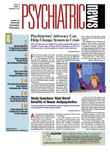After Democrats were unable to garner the votes necessary to override President Bush's veto of the State Children's Health Insurance Program (SCHIP) legislation, congressional leaders shifted to an attrition strategy to build support for the legislation over the coming weeks and months.
Democratic congressional leaders plan to hold regular votes on their bill to reauthorize and expand SCHIP to pressure a small group of Democrats and Republicans who opposed the bill to change their position. In mid-October Congress fell 18 votes short of overriding Bush's veto of the SCHIP bill (HR 976), which would have expanded the eligible population. Bush opposed the legislation because he thought it would have been too expensive and because of the provision to fund the expanded coverage through a 61-cent-per-pack increase in the federal tobacco tax.
At press time, Democratic leaders were in negotiations with Republicans to gain veto-proof support for differing versions approved by both chambers in late October and early November.
Over the next five years, the vetoed bill would have provided an additional $35 billion in funding for the program and increase total SCHIP spending to $60 billion.
The House considered a modified bill in October capping eligibility at 300 percent of the federal poverty level in all states. The vetoed version gave high-income states the option of setting a higher income ceiling. The modified bill also would give states greater authority to assess the validity of applicants' Social Security numbers to confirm their U.S. residency status.
Some Republicans requested changes that would apply the same proof-of-citizenship rules used by Medicaid to SCHIP. Critics, including APA, have maintained, however, that those rules make it difficult for many Medicaid-eligible individuals to apply for that program.
The bill—as revised in October—also would phase out childless adults from SCHIP within one year, instead of the two years allowed in the vetoed bill. The provision aims to end the Department of Health and Human Services' practice of allowing states to use unspent SCHIP funds to provide insurance coverage for some low-income, childless adults.
Moderate Republicans such as Reps. Ray LaHood (Ill.), Fred Upton (Mich.), Charles Dent (Pa.), and Michael Castle (Del.), met with Democratic leaders to discuss changes to the bill that might garner additional GOP support.
Republicans urged three changes that would likely boost support among members of their party. They said that the legislation needs a greater focus on covering children in families with annual incomes less than 200 percent of the poverty level, more antifraud measures and stronger mechanisms for keeping illegal immigrants out of SCHIP, and discouraging families from dropping private insurance coverage to enroll in SCHIP, which is referred to as“ crowd-out” (Psychiatric News, September 21).
Ways and Means Committee Chair Charles Rangel (D-N.Y.) has said that a revised bill needs to make explicit that children from high-income families and illegal immigrants are not eligible for SCHIP.
Narrowing eligibility to 200 percent of the poverty level likely would, however, result in fewer than 10 million children receiving coverage under the program, which is why Democrats would not likely support such a provision. House Speaker Nancy Pelosi (D-Calif.) repeated in multiple interviews that she would not support any changes that would cut a significant number of the 10 million children projected to receive insurance coverage under the vetoed bill.
The Senate passed an amended bill with a veto-proof majority.
There has been an intense public-relations battle over the fate of SCHIP, and in October Democrats seemed to be winning the fight. About half of Americans say they have more confidence in the Democrats in Congress than in Bush to handle the issue, according to a mid-October USA Today/Gallup poll. Only one-third of Americans thought Bush had the better position on this issue, while 15 percent said they had no preference.
However, Americans are also generally sympathetic to Bush's concern about the program leading to what he called “socialized” medical care in the United States. Fifty-five percent say they were very or somewhat concerned that expanding the program would create an incentive for middle-class Americans to drop their private health insurance to enroll in the publicly funded program. ▪
